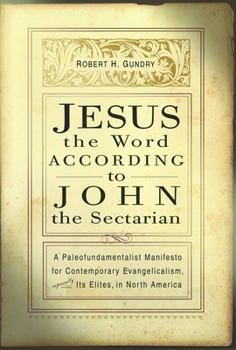Jesus the Word According to John the Sectarian: A Paleofundamentalist Manifesto for Contemporary Evangelicalism, Especially Its Elites, in North Ameri
Select Format
Select Condition 
Book Overview
Few have failed to notice the increasing accommodation of American evangelicalism to worldly culture. Unless this trend is corrected, evangelicalism will soon lose the distinctives that have... This description may be from another edition of this product.
Format:Paperback
Language:English
ISBN:0802849806
ISBN13:9780802849809
Release Date:October 2001
Publisher:William B. Eerdmans Publishing Company
Length:160 Pages
Weight:0.52 lbs.
Dimensions:0.4" x 6.3" x 9.0"
Related Subjects
Christian Books & Bibles Jesus Protestantism Reference Religion Religion & Spirituality TheologyCustomer Reviews
3 ratings
toward an exegetical ecclesiology
Published by Thriftbooks.com User , 19 years ago
Often the Protestant vision of ecclesiology is based solely upon historical theology and not exegesis. For this reason this work is refreshing. The three underlying theses are: 1) Jesus is the Word (Word-Christology) to the world in spite of itself; 2) the Gospel of John is primarily for believers as the elect (p.52, 56); 3) The love of God is not ubiquitous (without nuances, pg. 62-3). Gundry argues that an exegesis of John and his vision of the Christian community naturally flows from a view of Christ that is separatist toward the world. Gundry states, "The Fourth Gospel is unalterably countercultural and sectarian." (pg 64) He specifically attacks the cultural mandate as contradictory to Christ as the "logos" (word preached) to the world (pg 63). This is coming from the "reformed" camp!! However, he does not spend enough time justifying and explaining the nuances in God's love. This could be offset by reading Carson's "The Difficult Doctrine of the Love of God." Because this could leave the reader misguided I have only given it 4/5 stars. In the end I recommend this work.
Provocative, yes, but the sectarian solution is misguided.
Published by Thriftbooks.com User , 21 years ago
Gundry does indeed offer a provocative and engaging read in this book. The first part of the book, his exegesis of the Logos (Word) Christology of John is brilliant and informative.He also raises some valid concerns in the second part of his book concerning many evangelicals accomodation to current culture. However, his solution is far from adequate. I can appreciate his desire to bring a situational writing (as almost all the NT writings are) to bear on our contemporary situation. But positing Johannine "sectarianism" as a notion for overcoming evangelical worldliness fails to grasp some key theology in John and is downright harmful as many modern, fundamentalist movements have shown us. Having grown up in a sectarian denomination "non-denomination" myself. I can testify fully that sectarianism in most of the ways its proclaimed only undermines one's spiritual and emotional health. If Gundry, would use perhaps a different, more positive concept that "sectarian", then some of his points would be more encouraging to this reader. It is true that Christ is against culture in certain respects as his analysis shows, but Christ is also the transformer of culture which John's doctrine of the incarnation shows perhaps better than any other NT author.For more insights, look at the recent Evangelical Studies Bulletin put out by Wheaton College. 3 prominent scholars critique Gundry and he offers an incisive response giving his personal background in fundamentalism which was most interesting.Gundry once again has given us much food for thought and I thank him!
Provocative, must-read for all evangelicals
Published by Thriftbooks.com User , 22 years ago
I give this book five stars, not because I agree with everything Gundry says but because it is a message that we need to hear. Not since David F. Wells's No Place for Truth and companion volumes and D. A. Carson's Gagging of God has such a first-rate evangelical scholar provided such poignant and stinging criticism of evangelicalism's elite, so many of whom are wannabes (the seeker-sensitive church growth and contemporary Christian music industry wants to be like the current popular culture, much of evangelical academia wants so desparately not just to have a place at the table but to be liked and accepted by their secular academic counterparts, the Robert Webber types want to be like their liturgical and sacramentalist friends outside of evangelicalism, the neo-anabaptists want to be first and foremost this-worldy social reformers rather than other-worldly evangelists like their sixteenth-century forebears).Gundry is right in an aside he makes in the last few pages that we have much to learn from the evangelical churches in the third world. Perhaps Gundry raises more questions than he answers, and we can only hope that he will provide a follow-up volume to give us more--e.g., how better to balance engagement with the world, separation from the world, and proclamation to the world (p. 94). He has poignantly raised the questions. Now I hope either he or someone else will offer a worked-out proposal for how the evangelical churches must proceed in this new century. I also hope that some of the elites that feel stung by this book will have the courage to respond to it, rather than just sneering it at in private conversations.If we don't listen to concerns like Gundry's and Wells's and Carson's about selling our souls to the spirit of the age, evangelicals won't have a mind to have a scandal of, because evangelicalism will cease to exist.





